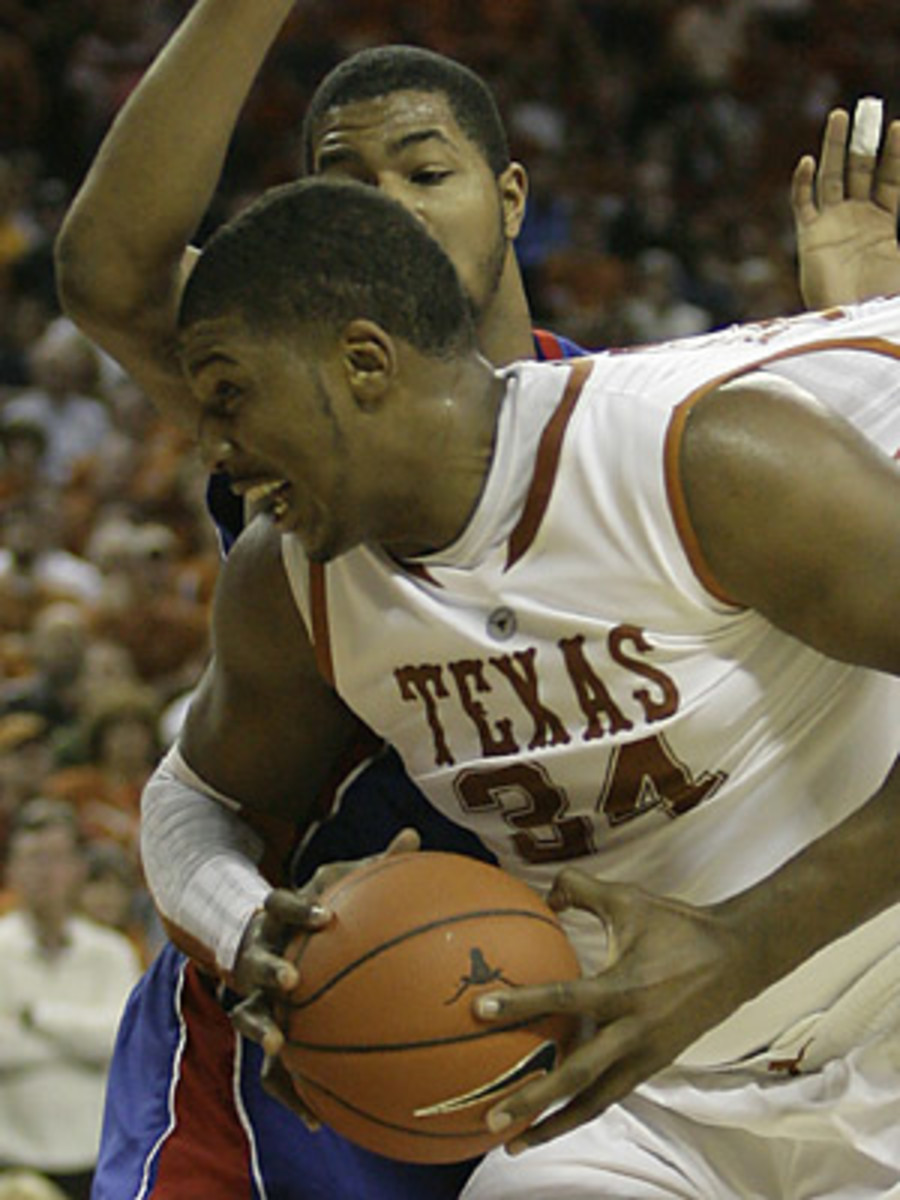Domination by Kansas exposes Texas' potentially fatal flaw
After watching Texas' latest implosion, its fifth loss in seven games since being ranked No. 1 on Jan. 18, it's hard to believe him. The Big 12's two powerhouses had been 1-2 in The Associated Press poll on New Year's Day, and this, their only meeting of the year, was viewed then as the marquee game of college basketball's regular season and a potential Final Four preview. Instead, it was an enormous letdown, with the gap between the two teams made clear by the 22-0 run the Jayhawks went on for a 10-minute, 19-second stretch of the first half.
Kansas (23-1, 9-0 in Big 12) looked like one of the two favorites -- along with Syracuse -- to win the national championship. Texas (19-5, 5-4) looked like a team that could very easily not make it out of the first weekend of the NCAA tournament. The defining difference? "They know," James said of the Jayhawks, "what they're looking for on offense."
The Longhorns' All-America power forward stopped there, only implying the rest: For the past few weeks, his team has had little-to-no idea what it's looking for on offense. They look for James, who played like the All-America candidate he is on Monday, scoring 24 points on 8-of-13 shooting, but as a whole they have no flow, no purpose, no direction. They've long been called the nation's deepest team, and yet the five guards who saw minutes against KU combined for all of two assists. Depth isn't an asset when everyone in your backcourt is struggling.
"If we could understand one aspect of this game, we could be the team we want to be," Texas coach Rick Barnes said afterwards. That aspect? "Assist-to-turnover ratio."
His team had six assists (the leader, with two, was center Dexter Pittman) against 17 turnovers. The Jayhawks turned those 17 turnovers into 27 points. Part of the solution, obviously, is the 'Horns have to take better care of the ball. But the lingering problem is that they don't have a guard who can confidently create and score. Barnes admitted as much in the lead-up to this game, saying, "I don't think we've had a person who can do that, someone who can take over a game, since D.J. Augustin left. ... There's no question we need that."
To that end, Barnes has decreased the minutes of two of his best backcourt defenders, Dogus Balbay and Justin Mason, and no longer plays them at the same time -- something he did frequently early in the season. They're so offensively challeged -- neither can knock down an open jump shot -- that defenses just sag into the paint and double-team Pittman, completely neutralizing the major impact he was having early in the season. "Even when we were winning, I told people that we had work to do," Barnes said. "At some point in time we were going to need to get some more offensive guys on the floor, or we were going to struggle in the Big 12."
The hope is that freshman combo guard J'Covan Brown, who scored 26 second-half points to finish with 28 on Monday, can be the guy who provides offensive punch. The Horns' ideal lineup, going forward, would be to use Brown and fellow freshman Avery Bradley at the 1-2 spots, and then Gary Johnson, James and Pittman at the 3-4-5. Brown and Bradley have both proven they're capable of scoring, but the onus will be on them to generate offensive opportunities for James and Pittman -- which neither guard did against Kansas.
Texas' backcourt woes were made even more evident by the presence, on the other side of the ball, of Kansas' Sherron Collins -- perhaps the best senior leader and crunch-time player in the country. He had a sub-par statistical game by his standards, shooting 3-for-13 from the field, yet finished with 15 points, five assists and just two turnovers. In the second half, he had four assists and zero turnovers, and was 8-for-8 from the free-throw line, refusing to let Texas make any significant dents in the lead the Jayhawks had built. "He's always poised when the crowd is loud," KU forward Marcus Morris said of Collins. "He's always the calmest one of the floor."
The game finished with a Collins exclamation mark. He dribbled over the half-court line with the clock running down and no one around him, then spiked the ball so hard into the floor that it nearly bounced up and hit the scoreboard as the buzzer sounded. With a huge smile on his face, he skipped toward the Kansas bench for flying shoulder-bumps, and later walked off the court holding up dual "No. 1" signs in the face of Texas fans holding up horns.
Other scoring stars emerged for the Jayhawks on Monday -- Morris had a team-high 18 points, and freshman Xavier Henry broke out of a slump to score 15 -- but they have a chance to run the table in the Big 12 because Collins gives them direction, stability, and confidence to win big games on the road. They have an offensive identity, with a clear leader and a multitude of auxiliary options. "They showed why they're the No. 1 team in the country," James said. "If we want to be there, we've gotta watch this game and see what we've got to do to make things happen."
There are certainly things Texas can fix -- protecting the ball, taking smarter shots, using lineups with better offensive chemistry. But none of those lineups will ever include a guard of Collins' ilk. And that's reason to worry that Texas, both in the short-term and the NCAA tournament, will not be all right.





